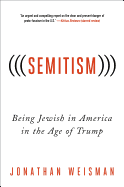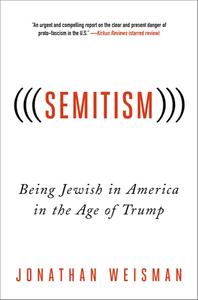
 When the history of his presidency is written, Donald Trump surely will hope that his inexplicable response to the violence sparked by racist and anti-Semitic demonstrators that occurred in Charlottesville, Va., on August 12, 2017, is not one of the defining moments. In (((Semitism))): Being Jewish in America in the Age of Trump, New York Times deputy Washington editor Jonathan Weisman (No. 4 Imperial Lane) delivers a concise but penetrating analysis of the rise of an anti-Semitic alt-right that has coincided with Trump's political ascendancy. And he offers a constructive prescription for countering what he calls a "new movement of prejudice and hate largely born in the invisible fever swamp of the Internet, now present in the flesh."
When the history of his presidency is written, Donald Trump surely will hope that his inexplicable response to the violence sparked by racist and anti-Semitic demonstrators that occurred in Charlottesville, Va., on August 12, 2017, is not one of the defining moments. In (((Semitism))): Being Jewish in America in the Age of Trump, New York Times deputy Washington editor Jonathan Weisman (No. 4 Imperial Lane) delivers a concise but penetrating analysis of the rise of an anti-Semitic alt-right that has coincided with Trump's political ascendancy. And he offers a constructive prescription for countering what he calls a "new movement of prejudice and hate largely born in the invisible fever swamp of the Internet, now present in the flesh."
Though he had a bar mitzvah ceremony in his native Atlanta, Weisman admits he had become "largely disconnected from Jewish life and faith." It came as a shock to him, then, in May 2016, when one of his tweets about the potential rise of authoritarianism in democratic societies drew a response that branded him with the "echoes" punctuation that's featured in the title of his book. Those parentheses have become a means for the alt-right (a name coined by one of its key figures, Richard Spencer) to identify on social media those they suspect of being Jewish.
Given its brevity, (((Semitism))) doesn't purport to be an exhaustive treatment of the rise of this odious movement. Weisman chooses, instead, to focus much of his attention on the frighteningly effective use of assorted online resources by people he describes as "technologically savvy, self-promotional, and absolutely vicious" to target and harass their opponents. One of the most disturbing such incidents involves the neo-Nazi troll attack on Jewish realtor Tanya Gersh, who had the misfortune to deal with Spencer's mother in Whitefish, Mont., where the movement's headquarters is located.
But Weisman frankly concedes that for all the unease among American Jews about the far right's muscle flexing since Trump's election, "anti-Semitism is not the worst affliction to beset the United States in the Trump era," at least not when compared to such outrages as physical assaults on Muslim Americans or the reversals of gay and transgender rights. That leads him to argue that Jews, rather than hunkering down and hoping this wave of bigotry will pass like a summer thunderstorm, need to make common cause with these oppressed groups to build "alliances against hate." He urges a "conscious move away from the Israel obsession of the largest Jewish institutions and a recognition that tribalism is leading Jewry into a box canyon crowded with some unsavory characters from the ethno-nationalist movement."
The rationale underlying Weisman's proposed response, if not necessarily the response itself, is likely to set off a lively debate within the American Jewish community. If it prompts a clear-eyed counter movement to these new agents of hate, he will have performed a valuable public service with this book. --Harvey Freedenberg, freelance reviewer
Shelf Talker: Journalist Jonathan Weisman exposes the tactics of the alt-right and offers a prescription for combating them.

